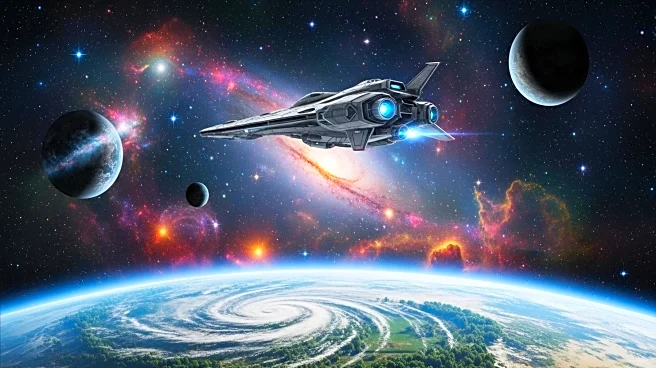What's Happening?
Several prominent science fiction authors have released new novels this September, exploring themes ranging from interstellar conflicts to environmental challenges. John Scalzi's latest installment in the Old Man's War series, 'The Shattering Peace,' delves into a potential war involving advanced alien species and Earth's involvement. Mason Coile's 'Exiles' presents a narrative set in 2030, where a human crew arrives on Mars to find a partially destroyed colony. Meanwhile, Yume Kitasei's 'Saltcrop' imagines a future Earth where coastal cities are flooded, and mutant fish populate the seas. These novels, along with others from authors like Cixin Liu and Nicholas Binge, offer readers a mix of speculative fiction that addresses both cosmic and terrestrial issues.
Why It's Important?
The release of these novels underscores the continued relevance and popularity of science fiction as a genre that reflects contemporary concerns and imagines future possibilities. Themes such as interstellar diplomacy, environmental degradation, and technological advancements resonate with current global issues, offering readers a lens through which to explore potential futures. These narratives can influence public discourse by highlighting the consequences of human actions and the importance of strategic thinking in addressing complex challenges. As science fiction often serves as a precursor to real-world innovation, these stories may inspire new ideas and solutions in fields such as space exploration and environmental science.
What's Next?
Readers and fans of science fiction can anticipate engaging discussions and analyses of these new releases, particularly in book clubs and literary circles. The exploration of themes like interstellar conflict and environmental crises may prompt further interest in related scientific and technological advancements. Authors may continue to expand these narratives, potentially leading to sequels or adaptations in other media formats, such as films or television series. Additionally, the reception of these novels could influence future works by these authors, encouraging them to delve deeper into the issues presented.
Beyond the Headlines
The novels' exploration of interstellar and environmental themes may also provoke ethical and philosophical debates regarding humanity's role in the universe and our responsibility towards the planet. These stories challenge readers to consider the implications of technological progress and the moral dilemmas associated with space colonization and ecological preservation. As science fiction often reflects societal values and concerns, these narratives may contribute to broader cultural shifts in how we perceive and address global challenges.








